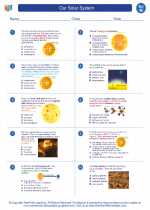Our Solar System -> physiological adaptations
Physiological Adaptations
Physiological adaptations refer to the internal biological changes that occur in an organism in response to its environment. These adaptations enable the organism to survive and thrive in its surroundings. These adaptations can occur at the cellular, tissue, organ, or system levels and are driven by natural selection over many generations.
Types of Physiological Adaptations
There are several types of physiological adaptations:
- Thermoregulation: This adaptation helps organisms maintain a stable body temperature in different environmental conditions.
- Osmoregulation: Organisms regulate the balance of water and solutes to maintain internal equilibrium, especially in changing osmotic environments.
- Respiratory adaptations: These adaptations help organisms cope with varying oxygen levels and different respiratory demands in their environments.
- Circulatory adaptations: Organisms may have specialized circulatory systems to meet the metabolic demands of their environments.
- Metabolic adaptations: Changes in metabolic processes allow organisms to efficiently utilize available resources.
- Behavioral adaptations: While not strictly physiological, behaviors such as migration and hibernation are closely tied to physiological adaptations.
Examples of Physiological Adaptations
Examples of physiological adaptations include:
- Camouflage: Some organisms have physiological adaptations that allow them to change their skin color to match their environment, providing camouflage from predators.
- Desert animals: Organisms such as camels have physiological adaptations that enable them to conserve water and tolerate high temperatures in arid environments.
- High-altitude adaptations: Animals living at high altitudes have physiological adaptations to cope with reduced oxygen levels, such as increased red blood cell production.
- Antifreeze proteins: Some fish and insects in cold environments produce antifreeze proteins to prevent ice crystal formation in their cells.
Study Guide for Physiological Adaptations
To study physiological adaptations, it's important to understand the following key concepts:
- Describe the different types of physiological adaptations and provide examples of organisms that exhibit each type.
- Explain how natural selection drives the development of physiological adaptations over time.
- Discuss the relationship between environmental pressures and the development of physiological adaptations in organisms.
- Compare and contrast the physiological adaptations of organisms living in different environments, such as deserts, polar regions, and aquatic ecosystems.
- Explore the impact of human activities on the physiological adaptations of other organisms, including the effects of habitat destruction, pollution, and climate change.
Understanding physiological adaptations is essential for comprehending how organisms have evolved to survive in diverse environments and how they continue to respond to environmental changes.
.◂Science Worksheets and Study Guides Eighth Grade. Our Solar System

 Worksheet/Answer key
Worksheet/Answer key
 Worksheet/Answer key
Worksheet/Answer key
